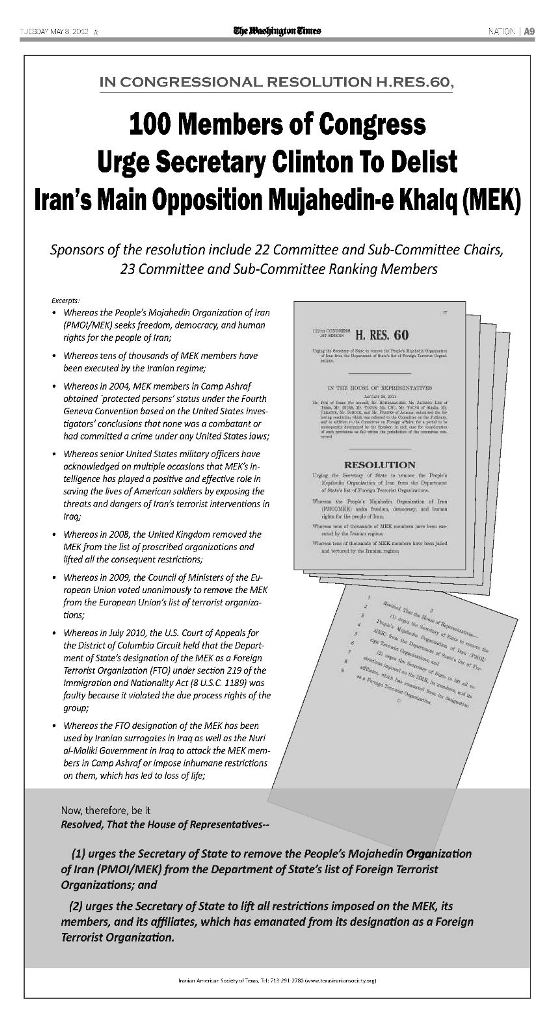BLOOMBERG NEWS
The People’s Mojahedin Organization of Iran, designated a terrorist group, must be told within four months by the U.S. State Department whether the label will be removed or an appeals court will order the change itself.
The U.S. Court of Appeals in Washington today said the department ignored a congressional mandate that requests for delisting be answered within 180 days, noting the People’s Mojahedin’s petition was filed almost four years ago. Unless Secretary of State Hillary Clinton rules within four months, the court will order the group’s delisting itself, the judges said.
“The specificity and relative brevity of the 180-day deadline manifests Congress’s intent that the secretary act promptly on a revocation petition and delist the organization if the criteria for the listing no longer exist,” the judges said in the decision. “The Secretary’s 20-month failure to act plainly frustrates the congressional intent and cuts strongly in favor of granting” the request by the People’s Mojahedin.
The debate over lifting the group’s designation as a terrorist organization comes as the U.S. and other powers are trying to negotiate an end to Iran’s suspected nuclear weapons program, and likely would be viewed as a hostile act by the Iranian government, said an administration official who spoke on the condition of anonymity to discuss a sensitive issue.
Useful Intelligence
Nevertheless, the official said, members of the group, known by its Farsi acronym MEK, have provided useful intelligence on the Iranian nuclear program to Israel, the U.S., and the International Atomic Energy Agency. A number of former senior U.S. officials, including former Federal Bureau of Investigation Director Louis Freeh and ex-Attorney General Michael Mukasey, are campaigning to remove its terrorist designation.
The People’s Mojahedin said in its 2008 petition that although it engaged in terrorist actions in the past, it had ended its military campaign against the Iranian regime, renounced violence, surrendered its arms to U.S. forces in Iraq and shared intelligence with the U.S. regarding Iran’s nuclear program, according to the ruling.
On Jan. 7, 2009, then Secretary of State Condoleezza Rice denied the petition. The court granted the People’s Mojahedin’s request for a review of that decision on July 16, 2010, saying that “due process protections” hadn’t been followed.
‘Slow Going’
“Since our July 2010 remand, the Secretary’s progress has been — to say the least — slow going,” the three-judge panel wrote. By failing to make a final decision, the Secretary is able to maintain the People’s Mojahedin status as a terrorist group, while preventing them from seeking judicial review, leaving the group “stuck in administrative limbo,” the court said.
“We are in receipt of the D.C. Circuit’s June 1 opinion, and we are currently reviewing it,” the state department said in a statement. Officials are continuing to review the group’s designation as a foreign terrorist organization, according to the statement.
Maryam Rajavi, the wife of a founder of the People’s Mojahedin Organization and the leader of the National Council of Resistance of Iran, a coalition of Iranian exile groups, welcomed the ruling in a statement as a “triumph of justice over machination and appeasement.”
Iranian Lever
Rajavi urged Clinton to move quickly to carry out the court’s order, saying the terrorist designation “continues to be a lever in the hands of the Iranian regime and the Iraqi government to suppress the residents of Camps Ashraf and Liberty,” Iranian refugee camps in Iraq.
The People’s Mojahedin was formed in 1965 to resist the Iranian Shah. After the Shah’s fall, MEK broke with the revolutionary Islamic government and engaged in armed action against the regime from Iraq. The group says it disarmed in 2003.
The Council of the European Union removed the MEK from its terrorist list on January 26, 2009, and the U.S. may follow suit if MEK members abandon their refuge at Camp Ashraf peacefully and disperse to other countries. If they remain there, some officials fear, Iraq’s Shiite-dominated government, which has close ties to Iran and killed 11 Iranians in a 2009 raid on the camp, might mount an all-out assault on the camp and its inhabitants.
The case is In Re: People’s Mojahedin Organization, 12- 1118, U.S. Court of Appeals, District of Columbia (Washington).
To contact the reporters on this story: Sara Forden in Washington at sforden@bloomberg.net; Indira A.R. Lakshmanan in Washington at ilakshmanan@bloomberg.net.
To contact the editors responsible for this story: Michael Hytha at mhytha@bloomberg.net; John Walcott at jwalcott9@bloomberg.net.
